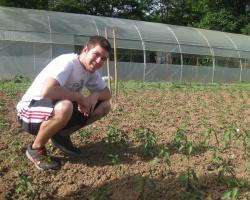Sometimes the best ideas can come from a plate of bland Mexican food. Eli Martin* is proof.
“I lived in Texas, so to me Mexican food isn’t Mexican food without jalapeños,” said Martin, who lives in a small city in Kosovo, an eastern European country just north of Greece. “When we go into Kosovo’s capital city, we love the rare treat of a Mexican restaurant, but they never had any jalapeños.”
A craving, when properly channeled, apparently can stop hunger. This one did.
Martin quizzed the restaurant owners about the jalapeño-shaped hole in his Mexican food experience and found they could get jalapeños occasionally, but they were imported from Germany and expensive.
“I asked if we grew them if they would buy them, and they said yes,” Martin said. He tried all the other Mexican restaurants in the capital city of Pristina, and they said the same thing.
Just that fast, Martin became Kosovo’s jalapeño supplier. For a group of Kosovo farmers, a livelihood was born. Martin got his dad to mail him seeds from the States, and a Kosovar offered to grow them on his pepper farm.
“His family is poor. It was a good project for them—they could sell the jalapeños for four times what the normal peppers go for,” Martin said.
So, they did.
“The jalapeños turned out perfectly. We canned them and sold them,” he said. “In Communist days, they all grew the same thing, the same kind of peppers, and didn’t have to worry about marketing or choosing crops creatively. Now they have this as a new source of revenue.”
The jalapeño income keeps them from having to resort to drastic measures. Until now, to cope with poverty, residents of a village near Martin’s city have sent their sons away or married off their daughters to people in other countries so they can work and send back money.
“Most people don’t have jobs or if they do, they don’t pay much,” Martin said. “The families we have been working with in the village have some land for planting and some income but not enough to live on.”
Thanks to One Farm, a project of OneLife, they now have food and firewood to get them through the winter. Kosovo is mountainous and cold, and in the snow-filled winter months, families historically have struggled.
This project is changing that, Martin said. The possibilities for growth are big, and the impact on impoverished families is even bigger.
“We had loads of jalapeños last year, more than we could sell to the country,” Martin said.
The restaurants bought them, and the local grocery store sold them, too. Martin also runs an American-style bakery in the village, and students who came to work there as semester volunteers also sold the jalapeños on site.
“We’re still selling them, and we’re hoping this year we can expand and export some, too,” Martin said.
The peppers are growing in popularity, and one of the restaurant owners who bought the jalapeños also got the farm a spot on the local television station. A TV crew came and filmed the peppers being canned at the bakery.
“We are praying this can grow to help as many people as possible. We were able to help two families last year, and we are hoping to help more this year,” Martin said.
The winter ground is cold in Kosovo right now, but soon student volunteers will start coming in to help the village farmers with the next year’s jalapeño crop as part of the OneLife: One Farm project.
“Some are coming to help put up a greenhouse, get some of the plants started and help at the bakery,” he said.
Others will help farmers harvest the peppers and learn how to sell them better.
The visit time is flexible—ideally students would come for about 60 days, but others are coming just for spring break or another weeklong trip. Through a student’s one life, he or she can make an impact on families plagued by poverty, hunger and cold.
“We are hoping these projects continue to bless the families, which in turn gives more opportunities to share the good news,” Martin said.
He also hopes the project can expand in the future, maybe to include sweet corn. The farm did a trial with it, and though it puzzled the Kosovar people at first; after some education, they loved it, he said.
“They didn’t expect it to be soft on the cob, but once they knew it was supposed to be that way, they ate it and loved it,” Martin said. “We might expand into that eventually.
For now, it’s jalapeños; and as for that idea and all the accompanying blessings, God is the source of them all, he said. “God did it. We just like jalapeños, and He gave us the opportunity that way. It’s all Him,” Martin said.
One life can make a difference, Martin said. To get involved, visit OneLifeMatters.org for more information.




